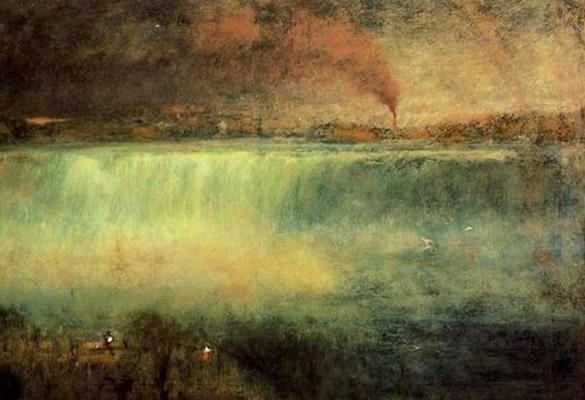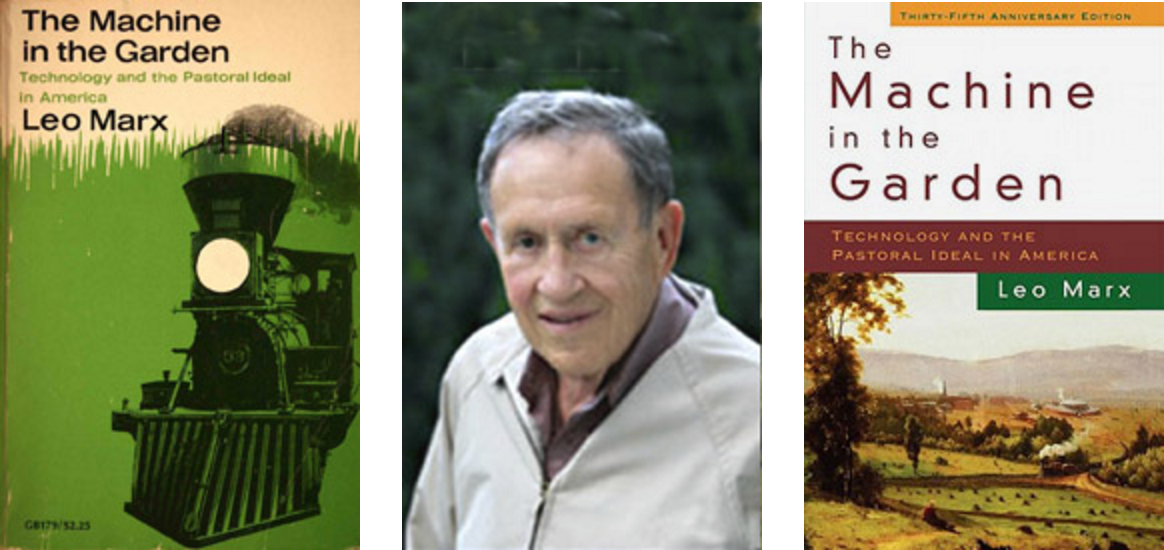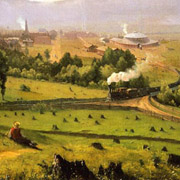3 Questions with Rosalind Williams
Interview about The Machine in the Garden by Leo Marx

Painting: Niagara, by George Inness, 1889
"At this point in American history it’s unimaginable to talk about anything of substance without talking about technology, the environment, and the American dream. This book was out in front. It’s about environment and technology before those two words became defining words of American consciousness."
— Rosalind Williams, MIT Bern Dibner Professor of the History of Science and Technology
On November 8, 2013, the MIT SHASS Program in Society, Technology, and Society (STS) held a symposium to celebrate the 50th anniversary of The Machine in the Garden: Technology and the Pastoral Ideal in America by Leo Marx, STS Professor Emeritus. The influential book examines technological change as seen through the writing of noted American authors, and explores the tensions between the "pastoral" and "progressive" ideals, which characterized early 19th-century American culture. The discrepencies between these two ideals evolved into the basis for current environmental thinking and debates.
Marx's work and research also helped to define the area of American studies concerned with the links between scientific and technological advances, and the way society and culture both determine these links. In honor of the occasion, Rosalind Williams, MIT’s Bern Dibner Professor of the History of Science and Technology, offered some thoughts on the enduring value of Marx’s work.
Was Leo Marx doing something new and revolutionary when he set out in the 1960s to write about the relationship between technology and culture using literature as his lens?
Yes. And it’s still unusual. There are two things he did at once in the book — and others of us are still working through the implications. One is to think about “technology” — and I put that word in quotes — in a broader sense than machines, gadgets or objects. Leo from the start is thinking about a technological age, a technological world, so that the history of technology is not limited to a study of a particular set of artifacts but is much broader and deeper. So that’s the first innovation of that book.
The second is drawing upon imaginative literature not only for evidence but for insight into the development of this concept of technology as it has played out in American life. There have been any number of books written about, say, the theme of the railway in literature. But when Leo opens Machine in the Garden with a series of episodes in which the narrator is in the woods somewhere enjoying a pastoral interlude, he’s drawing upon a deep knowledge of a literary tradition that goes back to Virgil.
He then asks: What’s different when that pastoral interlude is disturbed by a train whistle? What does it say about the whole vision of what America is about? Is it really about a new world of untapped resources completely removed from all the bad things of the old world? The railway in the garden becomes a key to understanding not just the narrator’s sensibility but a national dream. Leo’s work reveals a vision of what America should be and what it is, in fact, becoming.
What was the initial impact of Leo’s book on the field and on you personally?
In American Studies within a short time it was recognized as original and at the same time so important. He was looking at what we would now call the “environment” and at America as a landscape — as a place relatively unsettled compared to the old world — and combining that with the dream of industrial economic development, which is the capitalist dream of America.
I don’t remember exactly when I first read the book — though I met Leo in 1973, nine years after its publication — but ever since, I’ve been thinking about how its insights might apply to the Old World as well as to the New World. Any book that you read and are still thinking about more than four decades later is a stunning achievement.
Why do you think Machine in the Garden has never gone out of print?
At this point in American history it’s unimaginable to talk about anything of substance without talking about technology, the environment, and the American dream. This book was out in front. It’s about environment and technology before those two words became defining words of American consciousness. It was prophetic in looking to the lived experience of American life and seeing the tension between the world of what used to be called “nature” and the human-built world.
By looking back at these seminal writers of the 1800s, Leo was laying out for all of us an understanding of this persistent tension in American life. Each generation since has lived with this tension and finds in Leo’s work a guide to thinking about it. If anything it is becoming more acute as the country becomes more crowded with people and structures, so the pressures on the equivalent of the woods, the rural retreat, are all the greater.

Related Story
Symposium honors 50th anniversary of The Machine in the Garden
Suggested Links
The Machine in the Garden | Oxford University Press
About the book
For over four decades, Leo Marx's work has focused on the relationship between technology and culture in 19th- and 20th-century America. His research helped to define the area of American studies concerned with the links between scientific and technological advances, and the way society and culture both determine these links. The Machine in the Garden fully examines the difference between the "pastoral" and "progressive" ideals which characterized early 19th-century American culture, and which ultimately evolved into the basis for current environmental debates. — Oxford University Press
About Leo Marx
Kenan Professor of American Cultural History, Emeritus
Leo Marx received his B.A. (History and Literature, 1941) and his Ph.D. (History of American Civilization, 1950) from Harvard University. He taught at the University of Minnesota and Amherst College before coming to MIT in 1976. Professor Marx has three times been a Fulbright Lecturer in Europe, twice a Guggenheim Fellow, and a Rockefeller Fellow. He is a fellow of the American Academy of Arts and Sciences, and has been president of the American Studies Association, and chair of the American Literature Section of the Modern Language Association.
His work examines the relationship between technology and culture in 19th and 20th century America. He is the author of The Machine in the Garden: Technology and the Pastoral Ideal in America (1964);The Pilot and the Passenger: Essays on Literature, Technology, and Culture in America (1988); editor (with Merritt Roe Smith), Does Technology Drive History?: The Dilemma of Technological Determinism (1994); and editor (with Bruce Mazlish), Progress: Fact or Illusion? (1996).

Story prepared by MIT SHASS Communications
Office of the Dean, MIT School of Humanities, Art, and Social Sciences
Editorial and Design Director: Emily Hiestand
Senior Writer: Kathryn O’Neill